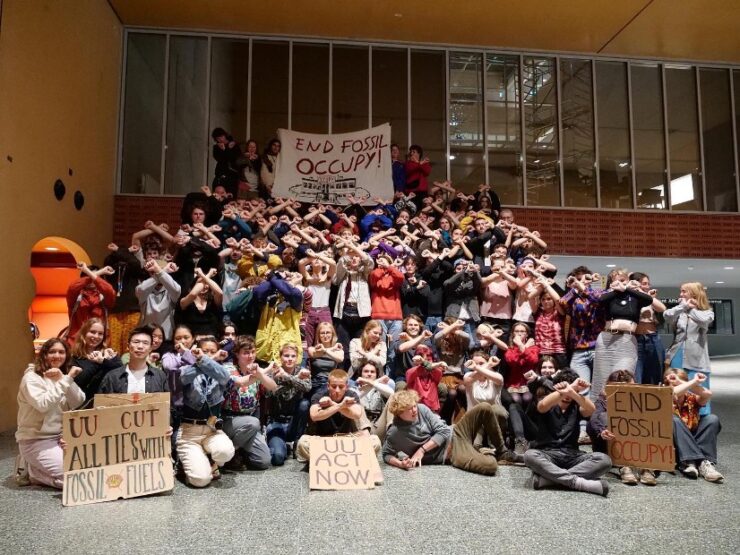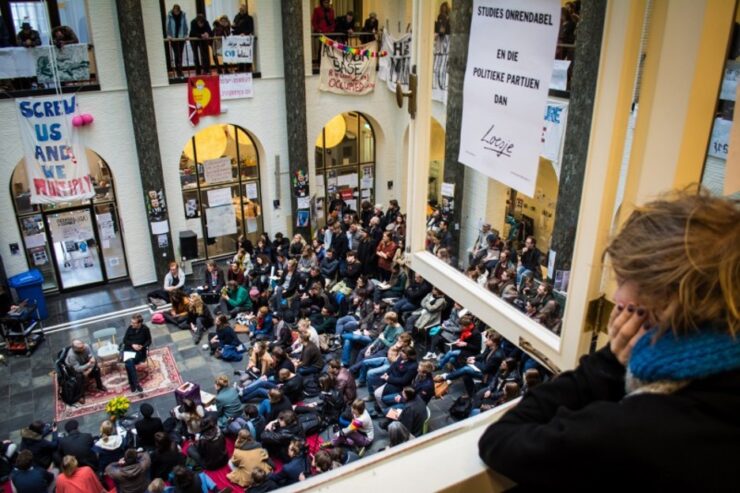Documentation
Recover, Reinvigorate, and Re-Occupy the Political Imaginary of the University in the Netherlands – Jingzhe Zhang
In his lecture Ohad emphasized the dual nature of the political imaginary – It is both an analytical tool and a proposition. If we turn our attention from international politics to where we are – the campus, we will see that in the Netherlands, exactly by losing the political imaginary of the university, we have lost the capacity for both critiquing and changing the field of education and research.

However, things are changing this year. Students and teachers sprang into actions all over the country demanding that we re-imagine the university. 16 January, a coalition of activist groups occupied the building of Amsterdamse Academische Club, demanding the University of Amsterdam to cut ties with Shell, the Big Oil company that has been obstructing energy transition and abusing human rights in the past decades. The executive board of UvA called police to evict the activists by force. At University of Groningen, students occupied the Academiegebouw to protest the university’s violation of social security – they fired Dr. Susan Tauber because she openly criticized gender discrimination and bullying within the university. RUG evicted them too. However, this did not deter actions. In May, seven Dutch universities, including Utrecht University, were occupied under the banner of End Fossil Occupy!.

These actions came after nearly a decade of silence in Dutch academia. The most recent movement of rebellion in Dutch higher education was the Nieuw Universiteit movement which was known for the Maagdenhuis Occupation at UvA in 2015. In “Why we occupy: Dutch Universities at the Crossroads,” Some occupiers set forth these problems within the university: “Increasing student/staff ratios, chronic underfunding, creeping micromanagement of research and teaching, and growing authoritarianism from university management are all conspiring to turn universities into a bureaucratic version of Walmart.” The most progressive component of the Nieuw Universiteit movement, the University of Colour, pointed out that the university is fundamentally exclusive where people with minority backgrounds are severely underrepresented and knowledge production and education are essentially Eurocentric. Democratization and decolonization, the two demands of the Nieuw Universiteit movement, are recovered in many actions this year. At UvA, the older generation of activists were invited to talk about their visions and experiences. The demands of Nieuw Universiteit, democratization and decolonization were re-activated in combination with a new one, decarbonization.

“L’imagination au pouvoir (power to the imagination)” was a slogan used during the May ‘68 revolts, recalls Mieke Bal in her response to the 2015 Maagdenhuis occupation, and she argues that we have to make our critique and revolt against “unimaginative reiterations of certain intellectually lazy patterns of thought and related expression”. Occupied in 1969 by student protesters who demanded democratization, Maagdenhuis is a site of rebellious memory and political imaginary.
However, political imaginary is always in danger. As we have seen, they are extremely susceptible to erosion from the status quo, simplification from verbalization, compromise from negotiations, hopelessness from failures, amnesia from the paralytic many, and stagnation from the nostalgic few. Can we keep recovering, reinvigorating, and re-occupying our political imaginary?
Bibliography
Bal, Mieke. “Power to the Imagination.” Krisis 2 (2015).
Celikates et al, “Why We Occupy: Dutch Universities at the Crossroads.” Open Democracy, https://www.opendemocracy.net/en/can-europe-make-it/why-we-occupy-dutch-un/.
“No Democratisation without Decolonisation.” University of Colour. https://universityofcolour-blog.tumblr.com/post/113871317488/no-democratisation-without-decolonisation.

